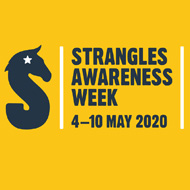Profession urged to 'speak out on strangles'

A strangles outbreak can be financially and emotionally devastating for owners and equine businesses.
Veterinary and equine professionals are being encouraged to lend their support to Strangles Awareness Week, which aims to eradicate the stigma surrounding the disease.
Strangles Awareness Week (4-10 May) provides an opportunity for vets, equine professionals, livery yard managers and horse owners to share their experiences, promote awareness and encourage support.
The initiative is the result of a collaboration between some of the UK's largest equine health organisations, including the Animal Health Trust (AHT), the British Horse Society (BHS), and Redwings Horse Sanctuary.
Owing to the COVID-19 pandemic, the event will be online and centred around various social media activities. Organisers also plan to utilise the lessons learned in previous weeks to reinforce the importance of good biosecurity and communication.
“It was always the vision of the collaborating organisations that Strangles Awareness Week would be a predominantly online event, so we’re really excited to still be able to go ahead with this new initiative,” explained Andie Vilela, Redwings’ campaign manager.
“In fact, while we are in the grips of a human pandemic and the public are being educated on the importance of social distancing and handwashing, amongst other simple biosecurity measures, this time presents a really engaging opportunity to reinforce how vital it is to apply these behaviours when caring for horses too.”
According to the AHT, there are around 600 strangles outbreaks in the UK every year. The disease is highly contagious, with symptoms including difficulty eating and depression, fever, thick nasal discharge and painful abscesses. In some cases, it can be fatal.
A strangles outbreak can be financially and emotionally devastating for owners and equine businesses. Often, horses stay infectious for many weeks, resulting in lengthy and expensive quarantine procedures and the potential closure of livery yards and events.
Unfortunately, the stigma surrounding strangles can prevent people affected from being open about an outbreak, which is an essential part of preventing its spread. This is what has led to the formation of the Strangles Working Group, a collaboration between the AHT, BHS, Keeping Britain's Horses Healthy, Redwings, Scotland's Rural College (SRUC), The Royal (Dick) School of Veterinary Studies and World Horse Welfare.
Strangles Awareness Week is the Group's first campaign, and vets can get involved by sharing their own experiences of strangles over on social media using the hashtags #SAW2020 and #speakouton strangles.
Coinciding with the campaign, vets can also take the 'Stamp Out Strangles' digital pledge – a voluntary commitment to maintaining good biosecurity practices, and make hygiene and strangles prevention normal topics of conversation with clients. Those who pledge will receive regular support through emails on the latest research into strangles to help themselves and their clients stay ahead of the disease.
To find out more about the campaign, and to take the Stamp Out Strangles pledge, visit redwings.co.uk



 The Federation of Independent Veterinary Practices (FIVP) has announced a third season of its podcast, Practice Matters.
The Federation of Independent Veterinary Practices (FIVP) has announced a third season of its podcast, Practice Matters.